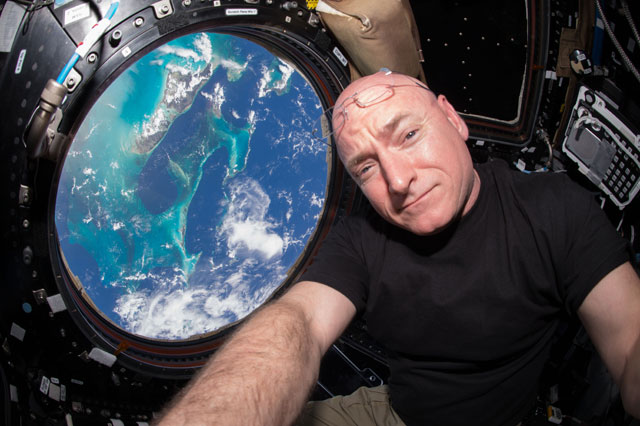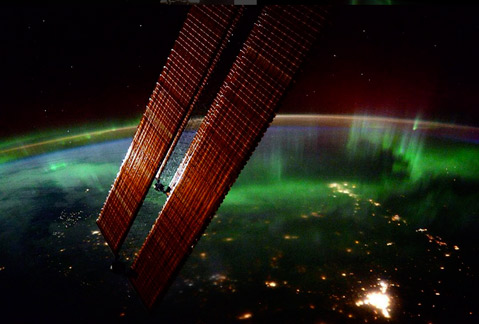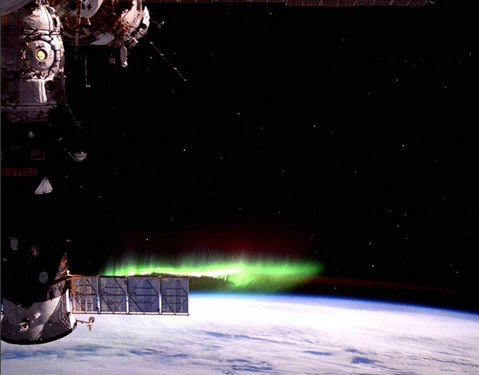Scott Kelly’s Orbital Perspective
A Year in Space Weighs on the Astronaut’s Mind and Body

A record-breaking year aboard the International Space Station did funny things to astronaut Scott Kelly’s body — he grew an inch and a half taller, aged slightly slower than the rest of us, and got used to not feeling the weight of his clothes in zero gravity. When he returned to Earth last March, his skin was so sensitive that it burned every time he moved.
The year above affected his mind, too. Kelly experienced what other space explorers have referred to as the “orbital perspective,” a soul-squeezing view of humankind’s home with all its natural beauty and man-made flaws. He watched neon-green northern lights dance over Canada and mud-red waters of the Nile flood over northern Africa. But he also saw air pollution so thick it hid half of China and saw where thousands of war refugees drowned in the Mediterranean. “It seems so peaceful when you’re looking at it,” Kelly said, “but the reality is so much different.”
Kelly’s mission — which he documented daily through Instagram — was a precursor to the three years of spaceflight it will take to eventually reach Mars. Scientists continue to monitor his physiology and compare it to that of his identical twin brother, who’s also an astronaut but remained on the ground for their unique “Twins Study.” In the meantime, Kelly has also embarked on a speaking tour about his life and his voyage, which will bring him to Santa Barbara on November 14. We spoke by phone last week.

What did you experience up there that the rest of us mere mortals might not understand? When you’re in space for a long time and you look down at Earth and its seven billion people, you appreciate what we have more — our planet, how it keeps us alive. It gives us everything, everything that has ever existed. All the people who have ever lived, everything that’s ever happened, is right down there. You appreciate the fragility. And you see how thin the atmosphere is.
I’d read that you could see pollution forming and disappearing in real time. Is that true? There are certain areas in China, India, and in Mexico City where you can’t see the ground; the smog is so thick. You’d think maybe those effects are seasonal, but they’re not. One day I was looking out over east China, and all of a sudden I could see this beautiful view at dusk of 200 cities that I hadn’t seen before. It was confusing. Then I heard on the news the next day there had been an important holiday, so the Chinese government decided to clear the air by shutting off a lot of their coal-producing power plants and keeping most cars off the road.
So not only can you see the negative impact we have; you can also see the positive impact if we decide to do something, and we need to do something about climate change. Otherwise, we’re going to really screw ourselves.
As a species and as a country, we already have our fair share of problems on the ground. Why should we keep exploring space? When we try to accomplish beyond what we think [possible], we develop technologies that improve life here on Earth. If it wasn’t for the Apollo program, our cell phones could still be the size of giant bricks, but back then we had to miniaturize computers to get those guys safely to and from the surface of the moon.
Plus, we’re explorers. We’ve always been explorers, and I think there’s value in seeing what’s over that next horizon. At some point, we’re going to have to venture away from this planet and this solar system if we want to continue to survive as a species. We’re talking billions of years, but I think it’s just part of our evolutionary development to reach out into space.
You also have to consider the value we get from kids in this country thinking they want to be astronauts. That’s a motivator for them to study science and math and technology. Not all of them will become astronauts; in fact, very few of them will, but it’s something that makes them strive to do better in those areas, and that has a real, tangible benefit.

As a kid, did you dream of being an astronaut? It’s something I thought about, but I never believed it was possible because I had a little bit of a problem paying attention in school. If I was a kid today, I would have been diagnosed with ADD or ADHD. It was impossible. Every year, I thought, “This is the year I’m going to start paying attention and doing my homework.” And that would last all of two days. But eventually when I got to college, I found something that motivated me, and that was a book called The Right Stuff. I just decided right then and there that this is what I’m going to do.
What do you think of the mini-space race between Jeff Bezos and Elon Musk? I think those guys are great. They’re real visionaries. When you have their resources, you don’t have to explain yourself to anybody, whereas the government and NASA have to justify every expense, get people to support projects, secure funds, and so on. Plus, those guys can think really long-term. NASA’s approach is sort of pay-as-you-go.
I met Jeff Bezos recently, and he’s not thinking, “Hey, I’m going to build this suborbital spaceship, because in a few years I want to fly passengers.” That might be a side benefit, but, no, he’s thinking 100 years from now. He’s looking at this as an investment in our civilization, not for his own personal benefit or glory but to see what we’re capable of doing.
It’s the same thing with Musk. He decided he wanted to go to Mars, and his original idea was to buy a rocket, but then he realized that the cost to access orbit was so expensive that the only way he could afford to do it was to build his own rocket from scratch. These guys had just outrageous ideas, but if they continue on the way they’re going, they’ll be mentioned alongside Thomas Edison and Benjamin Franklin one day.
Do you think we’re on track to get to Mars by Musk’s stated goal of 2030? Right this second, probably not. I don’t think we have the international infrastructure and funding set up. That doesn’t mean we can’t fix that between now and then. I don’t think there’s a technological showstopper. The biggest challenge is the cost.
If you had your druthers, where would new funding go? What goals would you like checked off the list? I think we should go back to the Moon and set up infrastructure and hardware that we could then use on Mars. The Moon almost seems like it was put there — this perfect place, at the right size, as a way to learn more and develop technology to go to Mars. I think there’s still stuff to be learned from the Moon. We didn’t spend much time there.
I know you’re a man of science, but did you have any existential moments up there? I’m kind of a news junkie, and in space we always had a news station playing in the background. I can remember the summer of 2015 and flying over the Mediterranean. It was so incredibly beautiful; then two seconds later we were hearing about these boats that were capsizing and these little kids washing up onshore. I found myself thinking, “Man, why can’t we do something about that? Why can’t we figure this out?”
By the time you speak in Santa Barbara, the election will be over. But care to weigh in on your pick for president? I’m generally an independent. I’m not a member of either party. But this is a very important election, and if we elect the wrong person, our country could be in big trouble. I’ll leave it at that. I’ll let people decide who the wrong person is.
4·1·1
See Captain Scott Kelly on Monday, November 14, at 7:30 p.m. at the Granada Theatre (1214 State St.). Tickets are available through UCSB Arts & Lectures at (805) 893-3535 or artsandlectures.sa.ucsb.edu.



